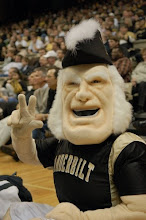However, yesterday's article in the Atlanta Journal-Constitution got me thinking a little deeper.
The AJC also includes a guest column by Dr. Boyce Watkins, who makes a compelling case to pay student-athletes:
I have witnessed students being taken out of class for an entire week to play in a nationally-televised football or basketball game, with academics (and the fact that the student's grade has been jeopardized) becoming an afterthought. Players are treated like professional athletes, not students, and a weak performance on the field will cause them to lose their scholarship. Any institution operating as a government-sanctioned cartel, riddled with hypocrisy, disproportionate and exploitative compensation schemes, and glaring disregard for educational values should be scrutinized more carefully.
On the whole, Watkins' assertion is sadly far too accurate: the NCAA is no longer the "amateur institution" it claims to be. Watkins goes on to argue that "the problem is that the NCAA is allowed to operate as a cartel."
In other words, all schools work together to make price-fixing agreements that prevent players from having any other options. This practice is illegal in nearly every other industry, because the source of labor then has no bargaining power.
NCAA President Myles Brand has the pleasure of presenting the case for the other side, and guess what? His argument is equally, if not more, compelling than Watkins':
Here is big news. Student-athletes have always been the only amateurs in amateur collegiate sports. From nearly the beginning of college sports 150 years ago, there have been paid coaches, and then paid administrators, and then all the rest. They are professionals. Intercollegiate athletics is their job.
Playing sports is not the "job" of students. They are not professionals at playing sports. They are amateurs.
If both sides are right, what's the solution? For starters, I don't buy the educational argument from Brand and others until all universities make a real commitment to helping their student-athletes graduate.
Furthermore, I think that Drs. Watkins and Richard E. Lapchick, president and CEO of the National Consortium for Academics and Sport and founder of the Center for the Study of Sport in Society, are on to something.
Their suggestion is to "tilt financial assistance toward under-privileged student-athletes," especially when the time commitment to their teams makes it impossible for them to earn part-time jobs.
"I've always felt that student-athletes should get some additional income, particularly those who come from families with less than traditional support," Lapchick said. "It's a huge, big business. Somehow, we have to find a way to give student-athletes more of a fair share."
Watkins said, "It makes no sense that a guy could be worth $10 million or $15 million a year to a school, and his mother is being evicted from her apartment."
No, it doesn't. Not at all. And while it's pretty clear that Brand will never pay student-athletes under his watch, Watkins and Lapchick may have found a pretty good compromise.





2 comments:
I don't know what college Dr. Watkins was teaching at when a football player missed an entire week of classes. How could that be possible when football players leave on a Thursday evening or early Friday morning for a Saturday game. There is noway possible a football player could miss an entire week of classes for a game.
Basketball on the other hand is very much possible.
So where do you cut the line in paying players? Do all D-1 athletes get paid? I know for a fact that most of the lower level Division 1 schools can't pay players. It is only the big conferences that could handle paying the basketball and football players. Do you pay Golfers? Some of them do go on to play on the PGA Tour.
Do you pay D-2 athletes and D-3 kids?
Just a dangerous area to go into.
What about college baseball players? Baseball only has 13.6 scholarships to give out, with a 35 man roster. You only talk about football and basketball. Baseball is where they get hurt in scholarships
Post a Comment